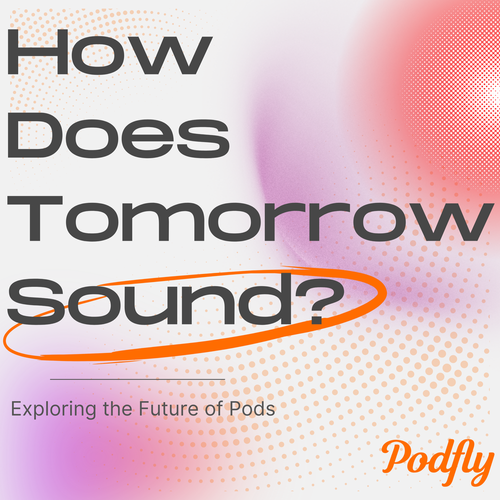FOLLOW:
Apple Podcasts | Spotify | RSS
How will listenership mature in the future? Will we outgrow our evolutionary need for story? Child psychiatrist, author, and horror enthusiast Dr. Steven Schlozman, Dr. Martin Spinelli, Dr. Sorcha Ni Fhlainn, Dr. Sylvia Chan Olmsted, and Podfly’s own Corey Coates offer insights. Story audiences mature and trends shift. Plus, with more diverse groups of light podcast listeners tuning in, there’s more opportunity to reach new niches. But what kinds of stories will these new audiences want today and 10 years from now? We look at shifts in audience expectations by examining Frankenstein: the book by Mary Shelley, the film with Boris Karloff, and updates like Blade Runner and Terminator. We still fear artificiality and continue to love stories that wrestle with what we most repress. But what monsters do we face today? And what about in 10 years?
If you dig us, please subscribe, review, and share — it really helps. And thanks!
The Big Takeaways:
Will people tune in to AI chatbots? Why do we listen to podcasts? How are listenership trends changing? How will they change in the future? How will the future of an audience change stories in the future?
Dr. Steven Schlozman, Associate Professor of Psychiatry, Geisel School of Medicine, Dartmouth, and child psychiatrist at Dartmouth-Hitchcock Medical Center
Dr. Steven Schlozman
Author of Film (Arts for Health).
Author of The Zombie Autopsies: Secret Notebooks from the Apocalypse
TedxNashville Ted Talk “What Horror Films Teach Us About Ourselves and Being Human.”
TEDxCoconutGrove Talk. “Zombies Are Already Here: But It’s Not What You Think”
“You go for a walk with a podcast, it's just you in the story. And that’s incredibly peaceful.” — Dr. Steven Schlozman
“We move forward with our ideas about the world, through art. I really believe that.” — Dr. Steven Schlozman
“The hopeful part here is that now we have this mechanism to use art, which we've used for thousands of years, to make sense of the world and to also have ideas about what to do to fix the world.” — Dr. Steven Schlozman
Dr. Martin Spinelli, Professor of Podcasting & Creative Media at University of Sussex, University of Sussex (on Twitter @exilewriter)
Dr. Martin Spinelli
Co-author with Lance Dann of Podcasting: The Audio Media Revolution.
Co-creator with Lance Dann of companion podcast, For Your Ears Only.
Executive Producer and writer on The Rez, a sci-fi podcast for 9–11 year-olds that covers a lot of the subjects we’ve talked about in this episode, especially how to overcome AI ubiquity and promote pro-social human relationships. The clip we played came from Episode 2, “Sav Smarts.”
“I was totally transfixed. I knew something had shifted in our audio universe.” — Dr. Martin Spinelli
“It is you speaking to me in my ears, actually in my ear canals, in my skull, in my body, your voice is there inside me.” — Dr. Martin Spinelli
Corey Coates
“The role of an artist in the world is to observe it, feel it, to interpret it, internalize it, and then reflect it back to you in a way that you’ve never seen it before.” — Corey Coates, Podfly
“We’re so focused on the medium … that we’re losing the plot of what it is we’re trying to do — connect our perspective as a human with other humans.” — Corey Coates, Podfly
Dr. Sorcha Ni Fhlainn, Senior Lecturer in Film Studies and American Studies at Manchester Metropolitan University (on Twitter @VampireSorcha)
Dr. Sorcha Ni Fhlainn
Author of “Mary Shelley’s Frankenstein: The Birth of A Gothic Monster.” History Extra. BBC. London. 1 Feb. 2021
Author of Postmodern Vampires: Film, Fiction, and Popular Culture, as well as The Worlds of Back to the Future: Critical Essays on the Films, and contributor to Starring Tom Cruise, edited by Sean Redmond.
“It's so in touch with the liminality between life and death … What is the spark, that Promethean spark, that keeps us alive?” — Dr. Sorcha Ni Fhlainn, Manchester Metropolitan University
“We always need our monsters. We need outlets and culture. We need to be able to frustrate and vent and feel that we have purpose and feel that we can change and make a difference and speak back to power.” — Dr. Sorcha Ni Fhlainn, Manchester Metropolitan University
Dr. Sylvia Chan-Olmsted, Professor of Media Production, Management, and Technology and Director of Media Consumer Research, University of Florida
Dr. Sylvia Chan Olmsted
Chan-Olmsted, S., & Rang Wang. 10 October 2020. “Understanding podcast users: Consumption motives and behaviors”. New Media & Society.
“The uses and gratifications paradigm proposes that individuals are very active media consumers. We’re looking for something to gratify. We have certain needs.” — Dr. Sylvia Chan Olmsted, University of Florida
“The biggest development now is we are moving from heavy users to more light users. Now we have a much more diverse group of podcast users.” — Dr. Sylvia Chan Olmsted, University of Florida
“The biggest growth is 12-plus; 12 to 24-something; we're talking about young kids now listening too. … Maybe they learn something about a certain topic on TikTok that was interesting. And then they use podcasts to dive deeper into that topic.” — Dr. Sylvia Chan Olmsted, University of Florida
How will the future of an audience change stories in the future? This question is hard to answer. Maybe impossible. Here are some frameworks we’re using to think about it:
Copy the movies. Look at established media like film and television to see what trends are occurring there that might be primed for podcasts, like casting away framing devices or pushing the boundaries of interactivity.
Unleash the beast. Mine what culture represses, and bring that to the fore, like Mary Shelley did, like Elvis did. One thing we’re repressing is the weirdness of ubiquitous AI and constant data collection. Can we make art against that that feels new somehow?
Tell Your Truth. You are a wonder of the cosmos, a highly sensitive instrument of love and truth that can nourish the world with your singular voice. Howl into the universe the way only you can … Look at you. You’re alive!
Stop gaming an audience and make some art.
Other Resources
Buzzsprout. 4 October 2022. “Podcast Statistics and Data. [September 2022]” Webpage.
Shelley, Mary. Frankenstein (Project Gutenberg)
Milton, John. Paradise Lost (Project Gutenberg)
Frankenstein (film) 1931. YouTube. (Available for rent)
Contact Us
Tell us what you really think by emailing PodflyCalls@gmail.com or leaving us a voicemail at 440-290-6796.
Or check us out online:
Neleigh Olson (or on Twitter @IkeABoom)








